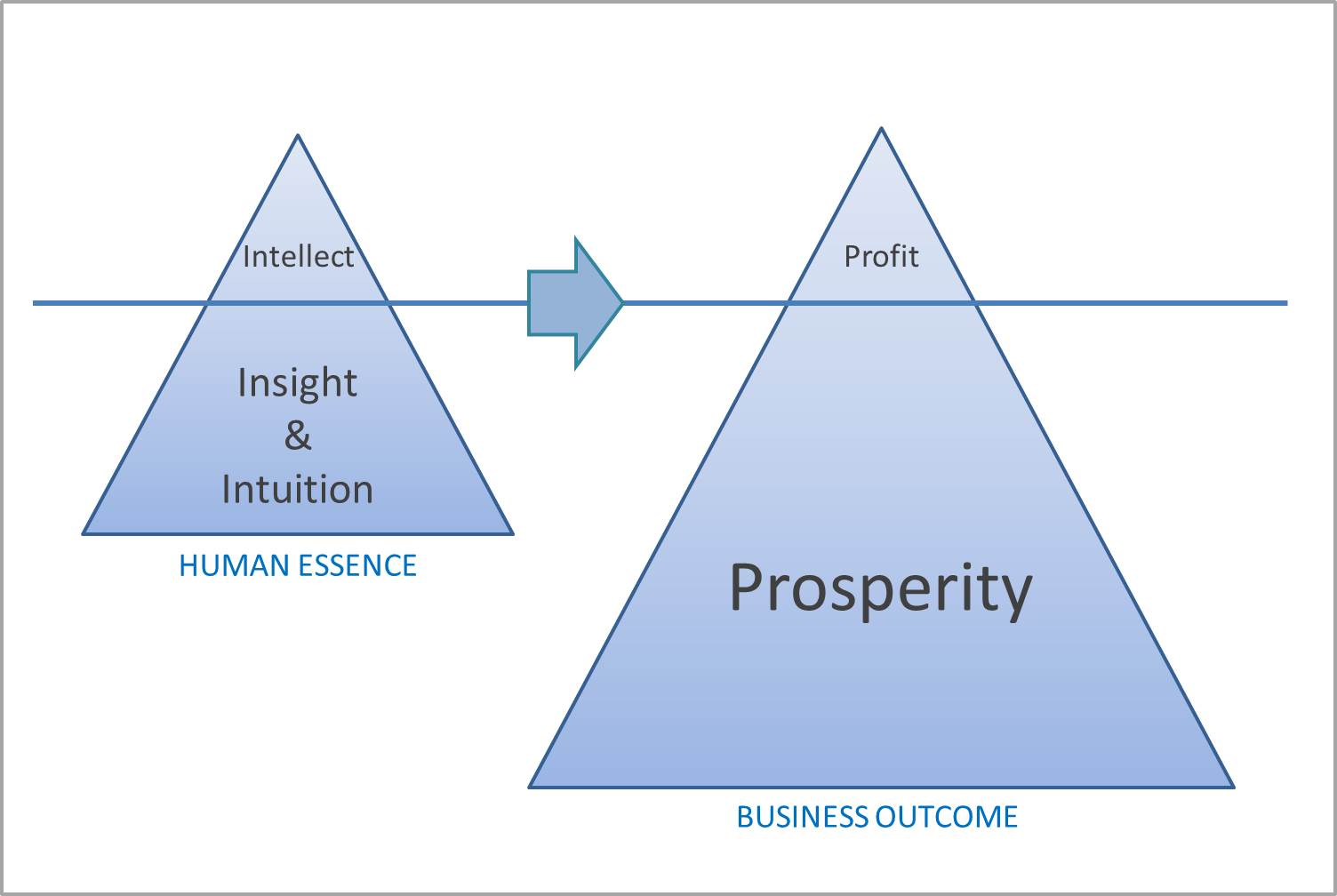It has been 60 years since Peter Drucker pointed out to the management world an importance of inner human world and its impact on prosperous organization functioning. Today, managers are finally embracing his words and are starting to “lead not only through knowledge, competence and skill but through vision, courage, responsibility, and integrity.” However, in order to fully reap the benefits of this ethos, it is important to approach it holistically, as Peter Drucker would and did.
Human essence, as I shall refer to the question of what makes us who we are, is often and conveniently diminished to human character, aptitudes, and virtues. Largely speaking, to intellect, knowledge, and reason. If managers adopt this consideration, they only see the tip of the iceberg. The larger, deeper, and more profound part of human essence remains unseen. Therefore, no matter how many and how promising initiatives management implements, if they are based on the surface manifestation of human essence, they will soon be rendered ineffective and unsustainable: more of Band-Aid fix rather than core-deep solution. To understand the wholeness of human essence, and thus the path to business prosperity, is to understand the “underwater” part, which is insight and intuition.
Why insight and intuition? And what makes them the core part of human essence? To start afar, according to Osho, “the reality is your interpretation of truth”, created through the mind and thought mechanism. Thus with intellect, surface manifestation of human essence, business, social, and global landscapes are not “what you see is what you get”: where some leaders see obstacles, others see opportunities. Insight, in turn, comes from the place of resting mind, active awareness and openness. While intellect is the periphery of human essence, insight has its roots in intuition, the center of your being. Once mind is exhausted, intuition steps in. Therefore, insight and intuition are the therapy for the current state of business frustration, answering questions that intellect alone is unable to do.
Further zeroing in on the initial question, there are great endorsements of insight and intuition as an essential part of human essence by business leaders, such as Steve Jobs and Angela Ahrendts. Jobs said:
“Don’t be trapped by dogma – which is living with the results of other people’s thinking. Don’t let the noise of other’s opinions drown out your own inner voice. And most important, have the courage to follow your heart and intuition. They somehow already know what you truly want to become. Everything else is secondary.”
Angela Ahrendts, in turn, is credited with remarkable revival and growth of British luxury brand, Burberry. I am an avid fan of her leadership and core principles. One of the lessons she teaches us is about intuition:
“Intuition is a form of wisdom, a gift of knowing without reasoning. When you’re not forced to over think things it’s amazing the clarity that emerges and how rapidly you can adapt. Intuition is usually more right than wrong. Why is it that we value thinking over feeling? Why aren’t we taught to follow our natural inclinations to protect the possibilities instead of just accepting the probabilities?”
From the above two quotes, we see both leaders embracing a wholesome understanding of human essence: intellect and intuitive insights. It is also important to note here that both leaders managed their organizations to prosperity, beyond profit. Therefore, while intellect and reason in business environment result in profit; insight and intuition lead to prosperity (more on this in Part 2).
Peter Drucker always strongly emphasized an “integrity of character” as a central factor in the tomorrow’s manager. In The Practice of Management he also addressed a presence of intuition in business:
“They [objectives] must not be based on the expedient or on adaptation to the economic tides. Managing a business cannot, in other words, depend on ‘intuition’. In fact, in the modern industrial economy with its long time-span between a decision and the ripening of its fruits, the intuitive manager is a luxury few companies, large or small, can afford.”
Drucker was right about sole reliance on intuition. He, however, gave it a dismal role to play. His statement “I believe in intuition only if you discipline it” in our time would sound like: I believe in intellect only if you discipline it. Nowadays we see everyone on the business scene is touched in one way or another by high levels of uncertainty, turbulence, high velocity, stalled revenues, and a shrinking customer base. With a short-time span between a decision and a result, managers and leaders are looking for ways to stay afloat and succeed by different means: from integration of big data at the heart of the organization to building transient competitive advantages. Intuitive manager is thus no longer a luxury but a necessity. In order for business to prosper, it needs to be anchored in the society and business leaders need to become role models of human essence-based management. Successful interpretation and application of human essence in business expression and initiatives, in turn, will lead to prosperity.
Read Next Part II of II: Human Essence Application Lessons in Management and Prosperity Creation
Author Biography
Ellina Watanabe, the Founding Director of Heresmé, is an intuitive consultant and brand strategist who helps individuals and businesses to (re-)discover their essence and master an “enhanced” decision-making process. She’s currently at work on her first book.
Follow her on Twitter @heresme_fr | Facebook.com/heresme.fr | Slideshare.net/Heresme
—
A blog following the Global Peter Drucker Forum 2014. An opportunity to share experiences and learn from one another in the context of The Great Transformation.


